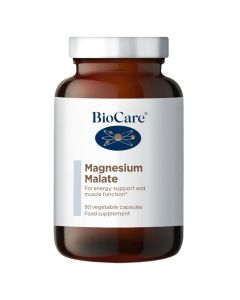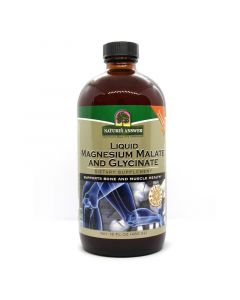
The Benefits Of Magnesium Malate
Magnesium Malate is a magnesium compound that has a huge number of health benefits, including improving exercise performance, reducing chronic pain and boosting mood. In this article, we look at the benefits of magnesium malate, how much to take, and in what form to make it most effective.
What Is Magnesium Malate?
Magnesium malate is a dietary supplement that combines magnesium and malic acid, both essential and beneficial nutrients for the human body. Magnesium is important for energy production as well as nerve and muscle function. Malic acid, often found in apples and pears, helps with energy levels and skin health maintenance. Together, they can work as a pain reliever, control blood sugar levels, enhance exercise performance, and improve mood.
Why Do We Need Magnesium & Malic Acid?
Magnesium supports muscle, nerve, and energy functions. When people have low magnesium levels they may experience weakness, mental health issues, and high blood pressure which can lead to adverse health conditions such as heart disease. Malic acid helps with muscle pain, exercise recovery, kidney stones, skin health, and energy production via adenosine triphosphate (ATP) – a compound that provides energy to cells in the body.
Taking magnesium and malic acid together as a compound is better than when taking them individually. The combination of both magnesium and malic acid makes the magnesium more bioavailable, meaning it makes it easier to absorb and therefore more effective. A study showed evidence of this. The combination of the two is also said to lower the risk of negative side effects.
Whilst magnesium can be found in some common foods, many of us are not consuming our daily recommended amount. Magnesium deficiency can also be commonly undiagnosed. Magnesium deficiency (hypomagnesia) symptoms include fatigue, tremors, and arrhythmias.
What Forms Of Magnesium Malate Are There?
Taking magnesium malate supplements is a simple way to ensure you are getting your recommended levels of both malic acid and magnesium. They are available as capsules as well as in liquid form.
Magnesium Malate Vegi Caps
Consumption of magnesium malate as a capsule is an easy way to get your recommended daily dose
Recommended product:
Magnesium Malate Liquid
Magnesium malate in liquid form is a great way to absorb the nutrients into the body and ideal for those who dislike taking tablets and capsules.
Recommended product:
Uses For Magnesium Malate
To Improve Mental Health & Decrease Symptoms Of Depression
Magnesium Malate has positive effects on mental health. There is growing evidence that a healthy diet has positive effects on mental health. This can be attributed to the benefits of nutrient-rich foods, such as those high in magnesium.
A review of 27 studies that assess the link between magnesium and depression concluded that increased magnesium intake correlates with lower depression symptoms (as evident in this 2015 study) and that it should therefore be used as a treatment.
To Control Blood Sugar Levels
Taking magnesium as a supplement helps to manage blood sugar levels, in turn, reducing the risks of diabetes. Having blood sugar levels outside of your target range cause a greater risk of diabetes which can lead to a variety of serious health problems.
Magnesium is necessary to metabolise our body’s sugar (carbohydrate metabolism) and helps to regulate your body’s insulin secretion, which is critical to health.
A study on 536,318 participants found an inverse association between magnesium consumption and type 2 diabetes risk. Other studies demonstrate that those who consume magnesium supplements are at a lower risk of type 2 diabetes (1, 2).
To Improve Exercise Performance
Magnesium malate improves exercise performance by enhancing the availability of energy and improving muscle recovery. Evidence suggests that taking magnesium and malic acid as a combination enhances Adenosine Triphosphate (ATP), as both are necessary elements in ATP production.
ATP is the body’s source of energy. It stores the body’s energy and releases it when muscles contract. Our body’s natural production of ATP declines with age. Enhancing ATP increases cellular energy and blood flow which is good for both physical and mental health.
Magnesium malate also helps to relax muscle tissues and relieve sore muscles. Fast muscle recovery is beneficial for continuous training to therefore improve overall fitness.
To Help With Chronic Pain
Taking magnesium malate supplements is a non-invasive approach to chronic pain. A survey of 13,434 adults found that magnesium intake (adjusted according to body weight) gave chronic pain protection.
Some researchers have discovered a link between fibromyalgia (FM) and deficiency in ATP. They connect Magnesium malate’s ATP-enhancing qualities with why FM sufferers have found relief when taking magnesium and malic acid supplements. This study on fibromyalgia patients who took the malic acid and magnesium combination had reduced pain and tenderness.
To Ensure Healthy Brain Development
There is evidence that Magnesium Malate’s ATP-enhancing qualities have neurological benefits. A study on metabolic agents that enhance the body’s ATP production proved that they also improve cognitive function.
Low magnesium levels can stimulate NMDA receptors excessively which can cause brain damage. So much so that low magnesium has been associated with dementia. Magnesium supplements are therefore being used as a recognised treatment.
It is well-known that sleep is needed for healthy brain development. A study on elderly people showed magnesium supplementation could be used to reduce insomnia.
Magnesium Malate: Side Effects
Consult your doctor before taking this supplement if you’re on medication for high blood pressure (hypertension), you have low blood pressure, or you are taking any type of heart medication.
Consumption of magnesium malate in high quantities can cause stomach upsets such as vomiting, gas, and diarrhoea. Doses of 1,200 mg to 2,800 mg a day are advised. Make sure to check the recommended dose as advised on the product packaging.
Magnesium Malate FAQs
Should I Take Magnesium Malate In The Morning Or At Night?
Morning. Due to the energy-producing qualities of magnesium malate, Dr. Stoychev of San Diego’s Centre for Health & Wellbeing, suggests taking magnesium malate mid-morning.
Is Magnesium Malate Good For Anxiety?
Yes, magnesium malate is good for anxiety. Magnesium blocks overstimulated neurotransmitters, which makes for a more peaceful state of mind. Magnesium also helps to regulate stress hormones like cortisol.
Magnesium with glycinate has shown to be the most beneficial combination to relieving anxiety and the effects of other mental health disorders. We recommend our magnesium malate and glycinate combination.
Is Magnesium Malate Good For Arthritis?
Yes, magnesium can help reduce pain from arthritis and other inflammation. It should not however be mistaken as a treatment. Magnesium supports bone health, including preventing osteoarthritis.
Is Magnesium Malate Good For Leg Cramps?
Yes. A variety of clinical studies have proven magnesium deficiency can cause muscle cramps and that supplements may be used to reduce them.
Is Magnesium Malate Good For Neuropathy?
Peripheral neuropathy, a type of nerve damage that can cause pain, numbness or weakness, is believed to have improved symptoms for patients with magnesium malate. In a study on the role of magnesium in pain, it is said that patients suffering from neuropathic pain have seen pain-relieving effects from magnesium treatment
Is Magnesium Malate Good For Restless Legs?
Yes. Due to magnesium’s muscle relaxant and pain reliever qualities, it can be beneficial in reducing restless leg symptoms. This study shows it is an effective treatment for those with RLS or PLMS-related insomnia.
Disclaimer
The products offered are not intended to diagnose, treat, cure, or prevent any illness or disease, or replace the advice of a medical professional. Results are not guaranteed and may vary from individual to individual.






